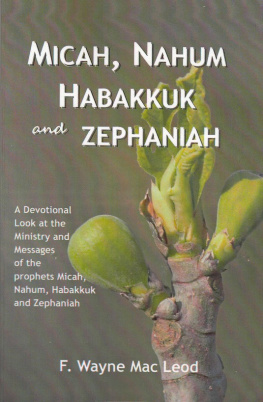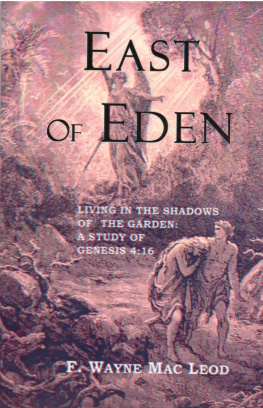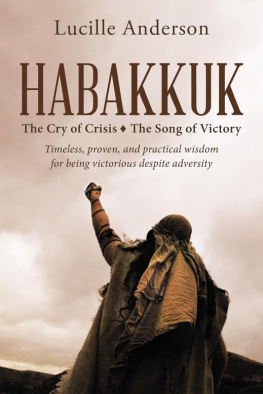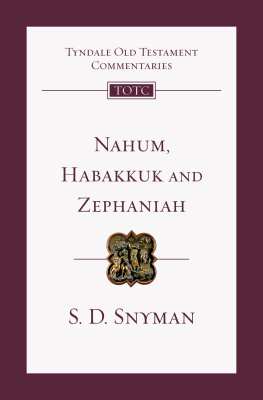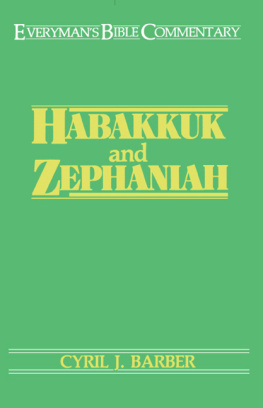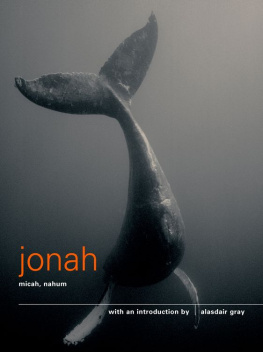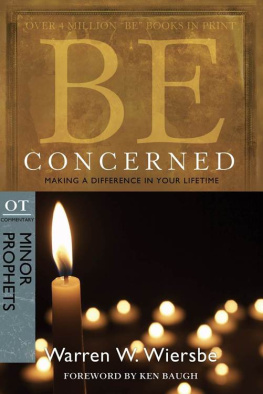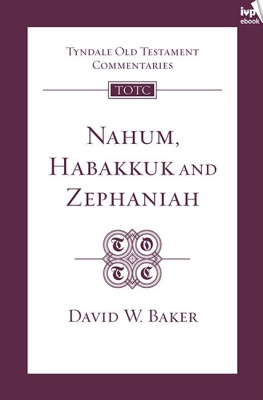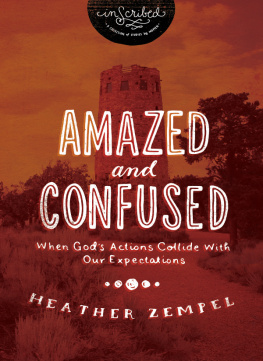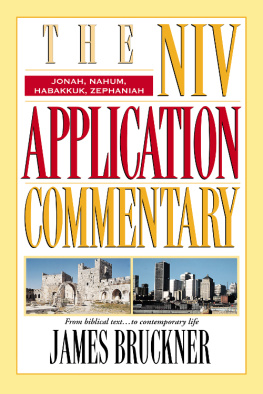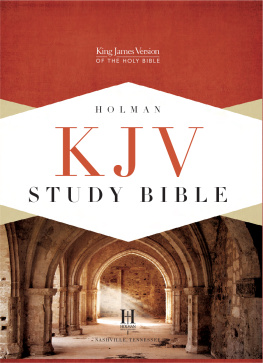MICAH, NAHUM, HABAKKUKAND ZEPHANIAH
A Devotional Look atthe Ministry and Messages of the Prophets Micah, Nahum, Habakkukand Zephaniah
F. Wayne Mac Leod
Light To My PathBook Distribution
Sydney Mines, N.S.CANADA B1V 1Y5
http://www.ltmp.ca
Copyright 2013 by F.Wayne Mac Leod
Smashwords Edition,License Notes
This ebook is licencesfor personal enjoyment only. This ebook may not be re-sold or givenaway to other people. If you would like to share this book withanother person, please purchase an additional copy for eachrecipient. If you're reading this book and did not purchase it, orit was not purchased for your use only, then please return to yourfavorite ebook retailer and purchase your own copy. Thanks forrespecting the hard work of this author.
Second edition:November 2013
Previously published byAuthentic Media, 129 Mobilization Drive, Waynesboro, GA 30830 USAand 9 Holdom Avenue, Bletchley, Milton Keynes, Bucks, MK1 1QR,UK
All rights reserved. Nopart of this book may be reproduced or transmitted in any form orby any means without written permission of the author.
All Scripturequotations, unless otherwise specified, are taken from the NewInternational Version of the Bible (Copyright 1973, 1978, 1984International Bible Society. Used with permission of ZondervanBible Publishers, All rights reserved.)
Scripture quotationsmarked NKJV are taken from the New King James Version, Copyright 1982 by Thomas Nelson Inc. Used by permission. All rightsreserved.
Scriptures marked KJVare from the King James Version of the Bible.
Special thanks to theproof readers and reviewers without whom this book would be muchharder to read.
Table ofContents
PREFACE
In thiscommentary, we will meet four prophets. We will hear how Micahexhorted a people whose materialism and greed had stripped them ofa sense of their need for God. We will meet the prophet Nahum whoencouraged Gods people by proclaiming victory over the enemiesthat had conquered them. We will see how Habakkuk struggled withquestions of evil and justice. We will observe how Zephaniah spoketo his people about a great renewal and cleansing in the land.Though Gods people had turned from Him, Zephaniah reassured themof Gods delight in them.
My prayer is thatthis commentary will bring the words of these inspired prophets toour present day and culture. As with the other commentaries in thisseries, this book is not designed to be intellectual and scholarlybut devotional in nature. It is my belief that the message of theseprophets is for us today. My hope and prayer is that, as you readthis commentary, the message of these prophets will be clear andsimple. I trust that the Lord will use this commentary to draw eachreader closer to Himself.
I encourage you totake your time reading this commentary. Do not read it in a singlesitting. Read the Biblical passage and use this commentary to guideyou in your reflections on it. Pray over each chapter and ask theHoly Spirit to reveal to you the truth He would have you to see.Take the time to see how these truths apply specifically to yourlife.
I have been sothankful to God for the way He has opened doors for this commentaryseries to grow. I trust that all readers will be blessed as theytake the time to read. My desire is for the Bible to come aliveagain to this age. I would ask you to pray for me as I continue todistribute this commentary series around the world. Please praythat it would touch many lives by bringing them back to theinspired Word of God. God bless you as you read.
F. Wayne MacLeod
INTRODUCTION TOMICAH
Author:
Little is knownabout Micah the author of this prophecy. His name is mentioned inverse 1 with the few details we have about his life. He was fromthe region of Moresheth. We are uncertain as to the exact locationof the city but it is believed that it was located in the north ofJudah close to the Philistine city of Gath. He prophesied duringthe reigns of Jotham, Ahaz and Hezekiah kings of Judah. He wouldhave ministered during the time of Isaiah.
His prophecieswere quiet influential in his day but they are also referred to bygenerations that followed. Reference is made to a prophecy of Micahin the days of Jeremiah (Jeremiah 26:18). His words were alsomentioned in the gospels (see Luke 1:72-73; Matthew 2:6; John7:42).
Background:
We have a glimpseof the days in which Micah lived through the lives of the kings ofhis day. Under King Jotham Judah enjoyed prosperity and militarysuccess. They experienced the favor of God on their lives. KingAhaz, however, turned his back on God resulting in God sendingforeign nations against his people. Under the leadership of Ahaz,Judah saw rapid spiritual decline. Ahaz would close the doors ofthe temple and give its furnishings to his enemies to gain theirfavor (see 2 Chronicles 28:24). When King Hezekiah became king, herestored the worship God but would become very proud in theprocess. God judged him for that pride.
Micah prophesiedto a people who struggled with materialism. They loved the thingsof this world. Micah spoke out against religious leaders who wouldtell people what they wanted to hear for money. He challengedpolitical leaders who were willing to take bribes and use thepeople of the nation for their own selfish goals. He spoke outagainst a people who would listen to anyone who prophesied plentyof wine and beer (Micah 2:11).
These were days ofspiritual compromise and moral decline. Gods people were lovers ofpleasure and riches. They had turned from the truth to satisfytheir fleshly lusts and desires.
Importance ofthe Book for Today:
Micah speaks tothe temptation to find satisfaction and meaning in the things ofthis world rather than in God. He addressed a people who loved theworld more than their God. He challenged spiritual and politicalleaders to walk in truth and not according to the sinful desires ofthe flesh. His words still speak to this temptation in our day.
Micahs prophesiedgreat blessing for the people of God but that blessing came not somuch through their political and religious leaders as it didthrough one great leader who would be born in the town of Bethlehem(Micah 5:2). This important leader was One whose origin was fromthe days of eternity. He was none other than the Lord Jesus whowould come to set His people free from their sin and restore themto the Father. In the midst of materialism and sin, Micah pointshis people to the coming Messiah who would alone be their hope andsalvation. This message is as important today as it was in the daysof Micah.
Chapter 1 -INTRODUCING THE PROPHET
Read Micah 1:1
This is theprophecy of Micah from the village of Moresheth, located in thenation of Judah. While he was from Judah, Micah prophesied to bothIsrael and Judah. The passage tells us that his words were forSamaria and Jerusalem, the capitals of both nations.
Notice that thisprophecy is not of human origin. Verse 1 reminds us that whileMicah is the author of the prophecy, the words are the words of theLord. The prophecy came to Micah by means of a vision. He wrotewhat he saw and heard in that vision from the Lord. These words arenot the reflections of the human author. They are the thoughts andwords of God to the nations of Israel and Judah. As we will alsosee, they are Gods words to us as well.
The name Micahmeans Who is like the Lord? This name reflects the uniqueness ofGod. There is none like Him in justice, in love, in holiness, or inpower. He is unique in His nature and being.
Verse 1 tells usthat Micah prophesied during the reigns of three of Judahs kings:Jotham, Ahaz, and Hezekiah This not only tells us when Micahprophesied but also gives us a better idea of the times in which helived.
Under the reign ofKing Jotham, Judah was militarily quite successful. Jotham walkedwith the LORD and grew quite powerful and influential. 2 Chronicles27:5 tells us that Jotham made war with the Ammonites and conqueredthem. During Johams reign, Judah enjoyed the favor of God and wasprosperous.

